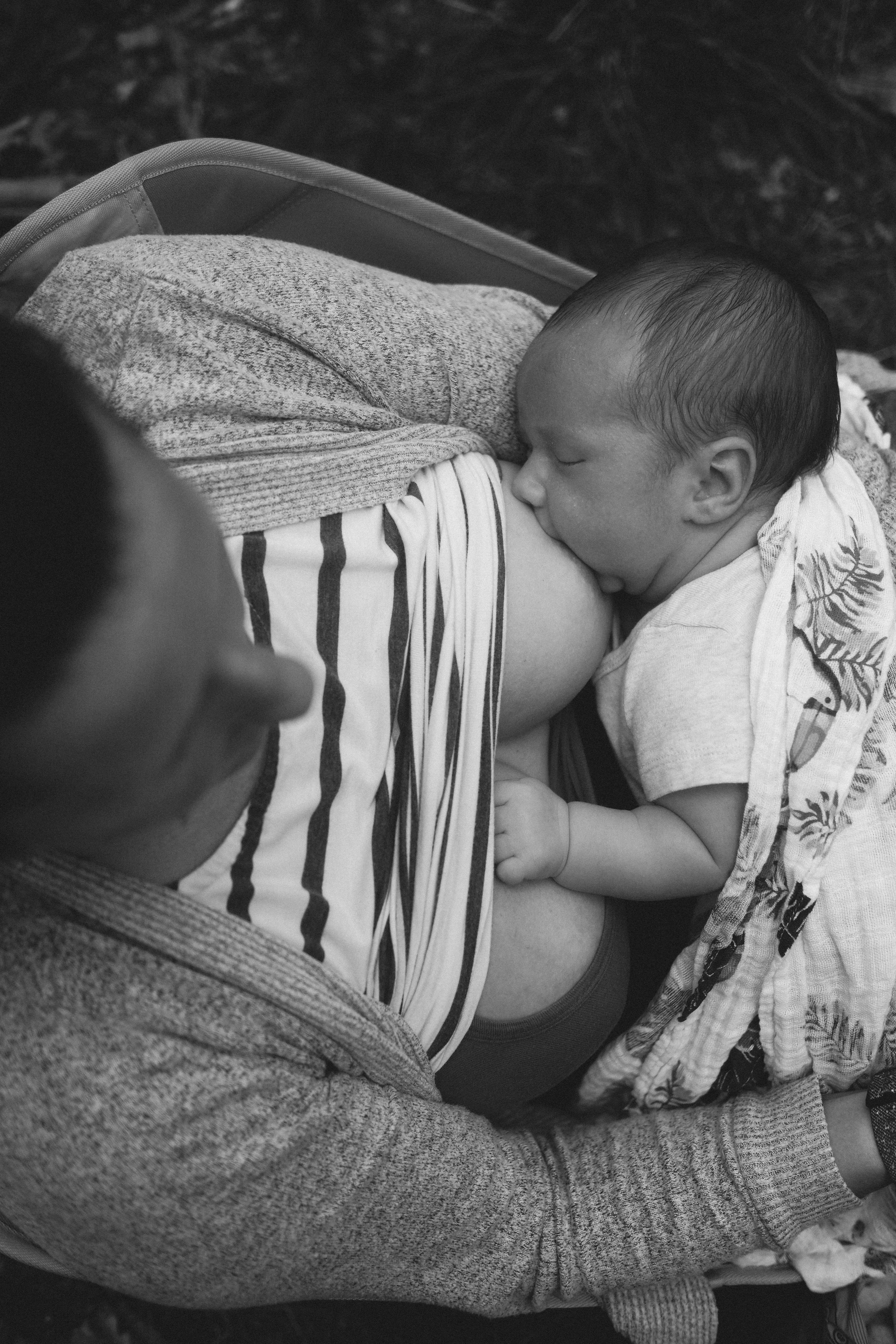
Set Up to Fail: Infant feeding, informed choice, and the case for policy change.
#SetUpToFail
“There is no doubt in my mind that we were set up to fail. We were told to breastfeed - made to think this was the only thing an educated person would do, but when it came to help with breastfeeding, they all just shrugged and said - we don’t know how to help you.”
In the UK, women are advised to exclusively breastfeed for the first six months of their baby’s life. While this is presented as a public health priority, a growing body of evidence suggests that current policy does not reflect women’s lived experiences or meet their needs. Despite most women planning to exclusively breastfeed, the majority go on to use formula at some point in the weeks after giving birth, yet the UK’s policy framework on infant feeding restricts proactive conversations on the use of infant formula, meaning women and their families are poorly prepared when breastfeeding challenges occur and infant formula is needed. Furthermore, the recent infant formula market investigation by the Competition and Markets Authority (CMA) has highlighted the role that guilt, shame and poor preparation for the possibility of formula feeding has played in the development of a distorted market which punishes parents at a vulnerable time.
Our report: “Set up to fail”: infant feeding, informed choice and the case for policy change” hopes to contribute to the development of policy that better supports women and their families in this area. We present findings from a survey in which more than 830 women shared their experiences of NHS delivered infant feeding support and advice. The report explores how some women feel they are being set up to fail - under prepared for the difficulties they may face when breastfeeding, often lacking the support they need to overcome challenges and denied information about infant formula and formula feeding.
We extend our deepest thanks to the women who took part in this research and generously shared their experiences with us. Many of the stories told were deeply personal and, at times, difficult to revisit. We are profoundly grateful for their honesty, courage, and trust. Their voices bring truth, insight, and the power to inspire change.
Join us in calling for the Government to overhaul NHS infant feeding policy and end women's guilt and shame
Summary of Findings
Key Findings
The research finds that the current framework of NHS delivered infant feeding care:
Pushes an ideal it fails to deliver and leaves women unprepared for the reality of infant feeding
Provides inconsistent support for breastfeeding
Provides poor support for formula feeding
Has a negative impact on women’s mental health
Ignores women's right to bodily autonomy and informed consent
Places maternity staff under significant constraints
Can excel when women feel their choices are supported
Requires comprehensive reform
Key Recommendations
The report proposes a renewed infant feeding policy with principles of shared decision making at its core, in which women are given fair and balanced information about benefits and downsides of all infant feeding methods, empowered to make the choices which are right for them and their families, and given the supported they need to exercise those choices.
It is clear that a new approach must:
Provide honest information about breastfeeding challenges, including pain, supply issues and latch and practical, timely support to help overcome these.
Deliver balanced advice about formula feeding, recognising it as a choice many families make for a variety of reasons.
Ensure women know that their own mental health is a priority and support feeding choices that work for each family.
Overhaul the communication of breastfeeding benefits to ensure they are in keeping with the evidence base and best practice in the standards of risk/benefit communication applied to other areas of healthcare.
Present combination feeding as a valid option that can support the continuation of breastfeeding, with practical guidance on how to do it
Our work demonstrates that the current infant feeding policy is failing women, and their families. It continues to adopt a paternalistic model of care which does not prepare women for the real challenges of infant feeding and prevents informed, supported decision-making that gets women and their families off to the best possible start. It is out of step with principles of informed consent that govern other healthcare issues, and results in failures in the duty of care to women as patients that is enshrined in the NHS Constitution.
The CMA has called for proactive, impartial information about infant formula to be delivered in a timely fashion. We support this recommendation but this report clearly shows this is not enough.
It’s time for infant feeding policy to centre the needs, voices and experiences of women. Urgent reform is needed, and it is needed now.
“There is no doubt in my mind that we were set up to fail. We were told to breastfeed - made to think this was the only thing an educated person would do, but when it came to help with breastfeeding, they all just shrugged and said - we don’t know how to help you”
KEY PILLARS OF AN OPTIMAL INFANT FEEDING POLICY:
More than half of women (52%) said the information they received did not prepare them for their infant feeding journey, and just 5% said it prepared them “well”. Most women (68%) intended to exclusively breastfeed their babies for the first six months, but less than half of those ended up doing so. Many moved to combination feeding or formula feeding sooner than they had planned. Many women described feeling wholly unprepared for how difficult breastfeeding could be. They expected it to be “natural” and that it would come easily, but experienced pain, latch problems, low supply and conflicting advice.
“I thought breastfeeding would be easy and just told my midwife I’d ‘give it a go’. I had no idea how difficult it was going to be with issues around getting a latch in the golden hours; how painful it could be; how all consuming it is.”
Only one in ten women said the NHS provided all the information and support they needed to overcome breastfeeding challenges or concerns. There were issues with access to timely or effective support for women who wanted to breastfeed. The most common challenge reported - tongue tie - was poorly managed, with long waits for assessment and treatment. Many women had to pay privately or stop breastfeeding altogether.
“Our biggest challenge was a severe tongue tie. The midwives could see it as it was so severe but the first nhs appointment to cut it was 5 weeks away. It was preventing a good latch but different midwives kept just showing me different positions. It wasn’t the positions that was the problem. The latch issue lead to multiple mastitis episodes on the first two weeks that required antibiotics. All could have been avoided with instant diagnosis and procedure.”
There was minimal proactive information about formula use, which left parents having to grapple with issues of sterilisation, preparation and quantities on their own - often in a period of high stress. Fewer than one in 10 women said they were given information on how to safely prepare powdered formula. Just 4% said they were given all the information and support they needed about formula feeding, and 57% had to find information elsewhere.
“We were encouraged so heavily to breastfeed but then when we had weight issues the [Health Visitor] wanted to move us to formula without trying interventions first. No support was given and I had to fight to see any support. This made me feel like I’d failed my child. I now combi feed and use ready to drink bottles as I still don’t know how to prepare powder formula. No-one has ever discussed how to formula feed.”
Feeding struggles were closely tied to feelings of failure, shame and depression. Women described long-lasting mental health effects, including postnatal depressions, anxiety and trauma which they related to infant feeding - whether they breastfed, combination fed or formula fed.
Half of all women said breastfeeding challenges made them feel low or anxious, and impacted upon how they felt as a mother. Shame around formula use was widespread - 75% of women who used it felt some guilt or shame, and 1 in 4 said they did not want to tell others they had used it.
“I got post-natal depression and in the end felt very low about breast feeding but felt so guilty for stopping and switching to formula. I thought I was letting my baby down.”
Many women described feeling like their own mental and physical needs were ignored in favour of feeding goals, or felt intense concern about the harms associated with not breastfeeding that were disproportionate to the risks. Others felt values such as the ability to share care were not given weight in discussions, despite the fact that 60% of women said formula feeding enabled others to share the responsibility of feeding.
“There was a sense in which you were an incubator with legs, then a sort of vending machine once you gave birth, not an intelligent human who could weigh risks and benefits.”
Healthcare professionals were frequently described by women as appearing restricted in what they could say about feeding. Women reported being told that midwives “couldn’t mention formula” unless asked, or information was supplied in a covert way.
““I was at high risk of developing post-natal depression as a result of my inability to breastfeed and perceived ‘failure’ as a new mother; my baby lost a huge amount of weight and we were both in a bad way. One midwife told me I just needed to make myself smoothies and that would help. Eventually one supportive home-visiting midwife ‘took her official NHS hat off’ and unofficially told us that it wasn’t uncommon to be unable to breastfeed after a traumatic birth (which no one had told us), and that she had fed two of her own children with formula and they had thrived - she then packed my husband off to the shops with a list of formula, bottles, steriliser etc so we could finally feed our hungry baby. I’ll forever be grateful to her.””


